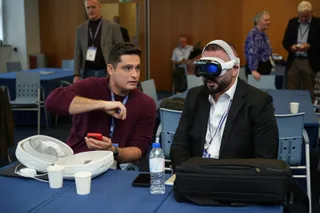Lynn University Removes Barriers for Women in Aviation Industry
Contact Our Team
For more information about how Halldale can add value to your marketing and promotional campaigns or to discuss event exhibitor and sponsorship opportunities, contact our team to find out more
The Americas -
holly.foster@halldale.com
Rest of World -
jeremy@halldale.com

“The biggest barrier that discourages women from entering and staying in aviation careers is culture – and it is the hardest to change,” said Dr. Heather Wilson, Women in Aviation Advisory Board Chair. “Women don’t feel like they belong. Changing culture requires consistent leadership commitment over time in thousands of large and small actions across government and industry. It’s hard work. It’s time to get started.”
While women make up only 8.4% of pilots, according to a Women in Aviation International (WAI) analysis, schools like Lynn University are working to remove barriers and support more women in aviation careers.
Women currently account for 20% of the school’s student pilots. In addition, 38% of the school’s instructors are women.
“At Lynn University, we are dedicated to promoting equal representation of women in aviation,” said Lynn University's Chief Flight Instructor, Spartak Keshtmand. “We are committed to supporting and empowering our female student pilots and instructors so that they may reach their full potential and contribute to the aviation community.”
Assistant Professor Jennifer Torres attributes its small class sizes, accessible and engaged faculty, and its variety of aviation programs as factors to attract and retain talent. Lynn University’s aviation programs include Professional Pilot, Aviation Operations, Aviation Security, Aviation Management, and it offers associate’s, bachelor’s, and master’s degrees.
"I believe the additional majors help increase female enrollment; there are more choices for women who have an interest in the aviation industry," Torres said.
In 2021, the school hosted a Girl Scouts Take on Aeronautics event for girls aged 6-12, which introduced younger generations of women to aeronautics.
“It was a great way to encourage young girls to consider the aviation industry and follow their dreams," said Meaghan Dempsey, class of 2024. She is one of the women studying to become a pilot through Lynn's College of Aeronautics. She founded a WAI chapter at the university, which received its charter in December 2021 and won the 2023 Boeing's Women in Aviation Flight Training scholarship.
Early recruitment, such as Lynn’s Girl Scouts event, is key to the recruitment of women in the industry.
The school’s practices align with the recommendations cited from the 2022 Women in Aviation Advisory Board’s report, Breaking Barriers for Women in Aviation: Flight Plan for the Future, which was submitted to the Secretary of Transportation, the Administrator of the Federal Aviation Administration (FAA), and Congress. The Women in Aviation Advisory Board was established by Congress in the FAA Reauthorization Act of 2018 (Public Law 115-254, SEC.602). The Board, which consists of 30 members, aims to develop and provide independent recommendations and strategies to the FAA Administrator to support female students and aviators.
The Board’s recommendations are grouped into five areas: culture, recruitment, retention, advancement, and data.
“Women's representation in aviation helps break down gender stereotypes and inspire future generations of girls to pursue careers in aviation fields,” said Keshtmand. “By encouraging and supporting more women in aviation, we can help ensure that the industry continues to thrive and that all individuals have the opportunity to pursue their dreams.”
The board urges that retention is crucial, but to retain women in aviation, organizations must create environments where women are seen, heard, and valued. Having accessible and engaged staff will help women as they continue in their studies. Lynn University’s culture emphasizes this.
"The entire program is designed to support and uplift women," said Dempsey.
The advancement of leadership roles must be visible, says the board, and women must be included in decision making. Professional development programs should be made specifically for women. Lynn University has many leadership opportunities for its students and supports them in their journey to become pilots.
"For me, Lynn has been great,” explains Dempsey. “Since it is a smaller school, there is a lot more individualized attention between students and professors. My professors know my short- and long-term goals and actively try to find ways to help me achieve them. Lynn also offers a lot of networking events that encourage professional growth and allow students to take an active role in getting involved in the field. Through flight training here at Lynn, students like me learn to forge the path they wish to seek in becoming a pilot."
"Faculty help connect us to scholarships and mentors while offering us the opportunity to serve as mentors to the next generation of flyers," added Dempsey.
With regards to data on women in the aviation industry, the Board determined that additional data and research is needed to fill the significant data gaps.
Attracting women to the aviation industry is crucial, especially at this time while the industry is experiencing rapid growth.
Keshtmand explains: “The importance of women in aviation cannot be overstated. Despite making up around half of the general population, women represent less than 10% of pilots in the industry. This lack of representation is a tremendous, missed opportunity, as many talented and gifted pilots could contribute to the field if only given a chance. Women have played a significant role in the aviation industry since its inception. From Amelia Earhart, the first female aviator to fly solo across the Atlantic, to modern-day female pilots and astronauts, women have made remarkable achievements in aviation. The participation of women in aviation is more important now than ever before. The industry is expected to grow rapidly in the coming years, and with that growth, there will be a need for more skilled and diverse workers. Women bring unique perspectives and skills to aviation, and their inclusion is critical to the industry's success.”
When asked how the industry could be more supportive, Dempsey elaborated: "I think it is important for the aviation industry as a whole to first recognize that representation matters. If women and other minorities see people like themselves flying, they believe they can do it too. Whether that is accomplished through having more companies take initiative to provide opportunities for minorities to work for them, or through removing gender biases by showing more women in the industry. There should also be more mentoring programs to help with encouraging women on their career path. Visiting schools, hosting career fairs, and coordinating field trips can help introduce the field at a young age.”


